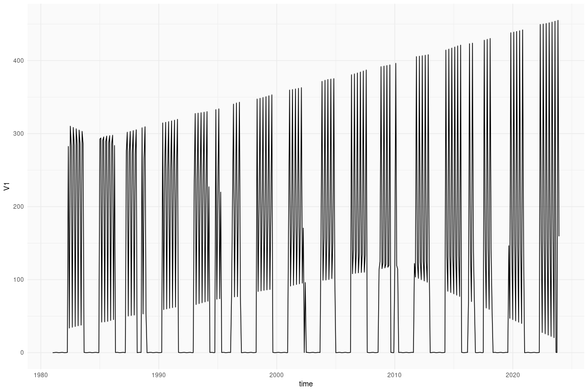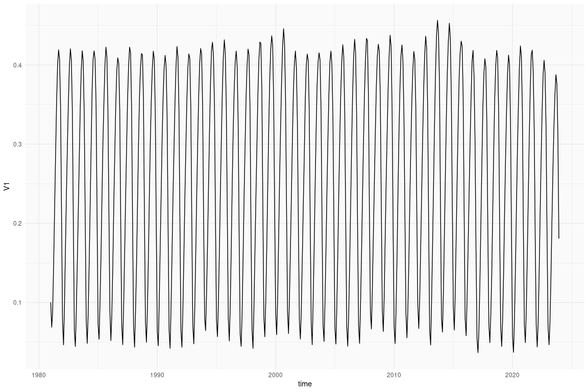data.table giving bizarre results on my system when compiled with the intel compiler. This is just a simple mean by time. The the GForce version goes all wacky. Using base::mean() returns to sanity.
#rdatatable
I see the hardware is of course an important aspect.
You could also try fread from #rdatatable and see if this works better for you.
Since I have quite powerful laptop, I rarely come to the limits. But this was different in the past. I did my doctoral thesis (R package development included) in part on an #EeePC. That was fun.
Gráficos feitos com #RStats, usando #RDataTable para ler e tabular os dados, e #TinyPlot (@gmcd) para plotar
#rdatatable is a pleasure to work with. Sometimes mind bending (why does it not work? 🤔 … ahh, lists 🤦♂️)
but most of the time great.
I use it in combination with #tinyplot. I had situations where my code got faster and shorter by doing this.
Enjoy
Friends near Madrid, check out this upcoming #rdatatable event!
A Zoom option is also available, if you want to join from afar.
https://www.meetup.com/grupo-de-usuarios-de-r-de-madrid/events/306199926/
(Presentation will be in English.)
#rdatatable would be sufficient for most of my demands I guess.
Therefore, I can unfortunately not offer a better comment.
Pela primeira vez, fiz revisão de "pull request" no GitHub. A mudança sendo revista era uma atualização da tradução do #RDataTable por @rafaelff
Late, but #AdventOfCode day 1,with #rdatatable
#rstats what wouldn't I give for a package that would bring #rdatatable syntax to #polars
#tinyverse starter pack
|> pipeOp {base}
#tinyplot https://doi.org/10.32614/CRAN.package.tinyplot
#rdatatable https://doi.org/10.32614/CRAN.package.data.table
#poorman https://doi.org/10.32614/CRAN.package.poorman
What did I forget?
@johnmackintosh My 1/2 a cent as heavy user of #rdatatable for the package name: short is not so important (you only write it once). I would have gone with data.table.utils or data.table.extras to make it absolutely obvious. There is probably some room for a left_join, inner_join, full_join, asof_join wrapper as well (should you look for features)
I am thinking of creating a package of helper functions for #rdatatable that makes things like DT[, .N, by][order(-N)] and other common actions a lot easier, and which also works with the new programming interface.
That particular code for descending sort is something I've written hundreds of times, and I'm fed up of it. Wrapping it into a simple function has been a real boon in my latest project.
If anyone thinks this package may be a good idea, let me know (somehow) on this post #RStats
Patch #rdatatable release 1.16.2 on CRAN #rstats
Most importantly we fixed a regression in print() + datatable.prettyprint.char option.
We also
- shipped the .mo translation binaries needed for the 🇪🇸🇫🇷🇧🇷 translations to actually show up
- fixed a segfault in fcase() due to the new default= implementation
- fixed fread() for timestamps with milliseconds
Thanks as ever to @healthandstats for managing the CRAN release process and to Ivan Krylov for some really insightful contributions!
I am really happy to become an official contributor of my favorite #rstats package #rdatatable
#rstats
Footering about with duckdb.
Discovered I can wrap setDT() around the whole tbl(con,data) |> wrangling thing, collect it and do some #rdatatable goodness, using some custom helper functions for some very common actions
It does mean a mix of old pipe and new pipe but I don't care about that so much.
Wish I'd experimented with this ages ago.
Edit: it's faster to wrap it in setDT too, rather than collect () then setDT on result. Didn't expect that TBH
#rdatatable
{data.table}
Was quite scared of it, didn't want to learn it really, but it kept cropping up as a solution.
Took the plunge, realised that it was not as hard as it seemed, and now, yeah, I think I love it.
It helped me massively with {runcharter}, and could not have done {patientcounter}without it..(fun fact, the person who inspired me to write that package has never used it. Luckily, plenty other NHS analysts have found it useful)
Say hello to #rdatatable 1.16.0 🎉
Many thanks to the dozens of contributors, new and old!
A quick thread on what to look out for 👀 #rstats
Someone said she felt undatable and I had to read twice, thrice because I thought it was un-data.table! 😅 #RDataTable


![library(data.table)
DT <- fread("./inputs/day-01.csv")
# part 1
DT[,sum(abs(sort(V1) - sort(V2)))]
# part 2
DT[DT, on = .(V2 == V1),.N, V2][!is.na(V2),sum(V2*N)]](https://files.mastodon.social/cache/media_attachments/files/113/584/387/159/888/138/small/26422510f81dcefe.png)
